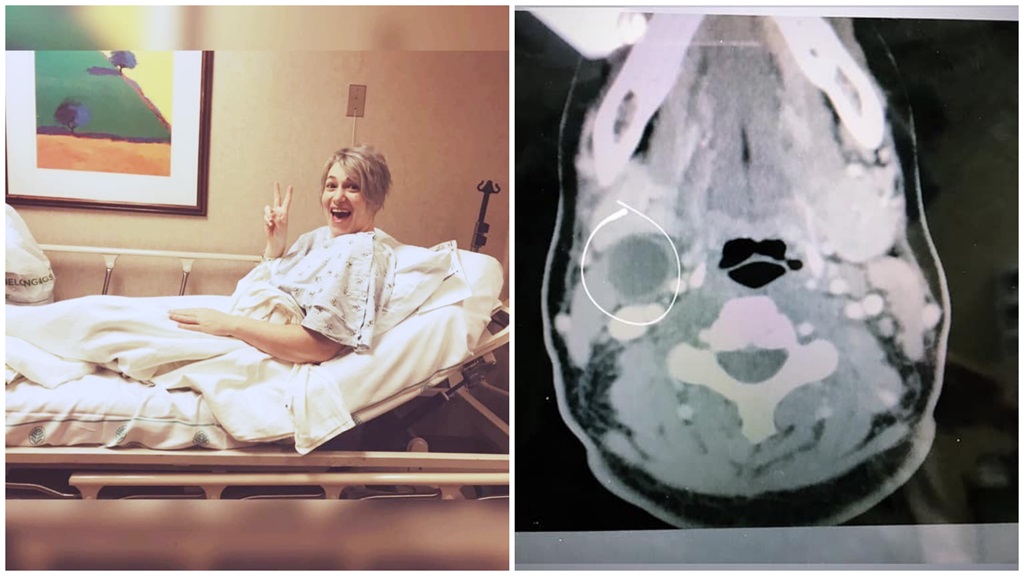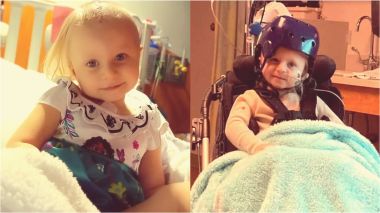When 33-year-old Courtney Pearce discovered a lump on her neck in December 2018, cancer was the last thing on her mind. Her doctor told her it was probably a cyst. And yet, after months of unsuccessful treatments, she was only getting sicker.
In February 2019, she received her answer: head and throat cancer, a condition that is most common among male smokers in their 50s. As a young, white, non-smoking woman, she was far from the primary demographic – but her case is part of a nationwide epidemic connected to HPV (human papillomavirus).
HPV is the most common sexually transmitted infection in the U.S. and the leading cause of cervical cancer in women. As has been discovered in the past decade, HPV can also cause throat cancers in both men and women. Most sexually active adults have already been exposed to HPV, according to the Centers for Disease Control and Prevention. The virus can lie dormant for years, and in rare cases, it can morph into cancer — which underscores the importance of the HPV vaccine.
The best time to get the HPV vaccine is pre-puberty, before a child’s first sexual encounter. The vaccine is safe, proven to prevent cancer and approved for men and women between the ages of 9 and 45, according to the FDA.
In Courtney’s case, she had been exposed to HPV during her adolescence, and the virus went unchecked in her system for years – until it metastasized in her lymph nodes. This is a great reminder of the HPV vaccine’s value, as a neck mass is the most common presenting sign of these types of cancers.
The first doctor Courtney consulted wanted to start cancer treatment, but she wanted a second opinion. She reached out to her network and found Levine Cancer Institute — and that’s when she started her journey to recovery.
Finding answers in one fell swoop
“For the past five or 10 years, there’s been a rapid increase in the prevalence of throat cancers caused by HPV,” says Daniel Brickman, MD, Courtney’s primary oncologist at LCI. Fortunately, head and throat cancer caused by HPV is extremely curable. “Up to 90% of people will be cured after appropriate treatment,” says Dr. Brickman.
Nationwide, radiation is the most common treatment for throat cancer – but it can have lifelong consequences, such as chronic dry mouth and damage to the blood vessels. Thanks to transoral robotic surgery, “we found [the cancer] and cured her in one fell swoop, without having to do radiation or chemotherapy,” says Dr. Brickman.
Transoral robotic surgery is a recent advancement in head and neck cancer treatment. In the procedure, the surgeon uses a computer-enhanced system to remove cancerous tissue with precision, which can result in a quicker recovery and fewer complications. Dr. Brickman’s team located the cancer in the back of Courtney’s tongue and, over the course of two surgeries, removed her throat mass and the cancerous lymph nodes.
Courtney says the tonsillectomies were rough, to say the least. “I was on a liquid-only diet for 1-2 weeks because as soon as I recovered, I had to go through another one.” But she had plenty of support, thanks to LCI’s multidisciplinary care team.
Courtney’s path to recovery
As part of her treatment, Courtney had access to a radiation doctor, medical oncologist, surgeon, nutritionist, speech pathologist and counselors. “I wouldn’t have been able to pivot if it weren’t for that help,” Courtney says.
During her recovery, she also practiced morning routines to keep her spirits up. She recorded daily voice memos that captured her gratitudes and future goals, and sent them to a friend, Kimi Morton. She maintained the practice even when she was recovering from surgery, and in June 2019, the duo met in person for the first time in Kimi’s home state of Hawaii.
Courtney also credits her success to Dr. Brickman. “He is very sharp!” she says, noting that he explained everything in a clear, understandable way and gave her the best treatment in the quickest time possible.
For Dr. Brickman, Courtney’s journey felt personal. When she first came to LCI, she wasn’t sure what to expect or where her diagnosis would take her. “Fast-forward six months and she’s almost certainly cured, beaming from ear to ear and excited,” says Dr. Brickman. “Taking her from a place where she’s lost and afloat, to put back together and excited and living her life … it’s an awesome victory.”
As for Courtney, who is now cancer-free, she has one message: “Anybody who’s going through cancer, you’re a warrior!”



